- Home
- Alex Lukeman
The Eye of Shiva
The Eye of Shiva Read online
The Eye of Shiva
By
Alex Lukeman
Copyright 2014 by Alex Lukeman
http://www.alexlukeman.com
https://www.facebook.com/alexlukeman?
All rights reserved. No part of this publication may be reproduced, distributed or transmitted in any form or by any means except by prior and express permission of the author.
This is a work of fiction. Organizations, places, events and incidents are either the product of the author's imagination or used entirely as an element of fiction. Any resemblance of characters in this book to actual persons, living or dead, is entirely coincidental.
"I am created Shiva, the Destroyer, Death, the shatterer of worlds."
- from the Bhagavad-Gita
CHAPTER 1
Rain from the South China Sea beat a monotonous rhythm on the rain forest canopy overhead. Nick Carter pulled his MP5 close to his chest and wished it would quit. The water fell in sudden streams through the leaves and down the back of his neck.
The rain forest stank of rot and mud and heat. Ahead of him, soldiers from the Philippines Special Forces Regiment moved in silence through a world lit with endless, green twilight. More followed behind. The trail under Nick's feet was churned into muddy ooze, slippery, laced with treacherous roots and crawling vines waiting to trip him.
Roots and vines were the least of his problems. Trip on a root and he'd get a sprained ankle. Step on a mine or trigger an IED, that step would be his last.
The objective was an abandoned rubber plantation on Mindanao being used by Abu Sayyaf, a brutal jihadist group that had left a trail of headless corpses and bombed out markets across the breadth of the island. All the other Islamic separatist movements on the island had agreed to recent peace accords with the government. Abu Sayyaf's response to Manila was to intensify their terror campaign.
The terrorists were flush with money and were using it to buy the latest in modern weapons. There were rumors they had made an alliance with the Taliban. If the stories were true, it would be an international terrorist alliance from hell. Those rumors and the unknown source of money were the reasons Nick was slogging through the Philippine rain forest.
Officially, he wasn't there. If things went wrong, there would be no posthumous medals or heroic speeches about valor when they buried whatever was left of him.
The leader of the Filipinos was a short, muscular man named Rafael Gabuyo. Captain Gabuyo had gone through Army Ranger training at Fort Benning and knew what he was doing, which gave Nick one less thing to worry about. Earlier, Gabuyo had sent his sergeant ahead to scout the objective. Nick saw the man return. The captain signaled a halt and beckoned Nick forward. The three men stood together on the trail, water dripping off the brims of their camouflage covers. Nick's green jungle fatigues were dark with sweat and rain.
At six feet and two hundred pounds, Nick dwarfed the smaller Filipinos. The heat and humidity of the jungle wrapped around him like a damp fist. A change in the sound of the water hitting the leaves signaled that the rain was letting up.
Thank God for small favors, he thought
"We are very close," Gabuyo said.
His voice was soft, muffled by the humid air. He pulled a folded black and white satellite photo from under his shirt and opened it out. It showed what was left of the plantation. A large house that had been living quarters for the overseer and his family still stood on the edge of the jungle. The rain forest was taking back the land, but the house and a broad, cleared space in front of it were still visible. Evenly spaced rows of neglected rubber trees marched away in the thick undergrowth. Vehicles were parked near the building. A winding, narrow track led away from the house and back to the nearest highway, miles away.
Gabuyo traced his finger along the photo and rested it at the corner of the cleared area.
"This trail we are on comes out here," he said, "a few hundred yards from where we are standing."
"Sentries?" Nick asked.
"Sergeant Ramirez says only one." He pointed out the spot on the map where the trail entered the clearing.
"I saw two more men walking around outside the building," the scout said. "They have AKs. I don't know how many are inside. There are two Land Rovers parked by the side of the house. Also a Toyota pickup with a heavy machine gun mounted in the bed. That's parked in front."
"Every terrorist's favorite ride," Nick said. "How do you want to do it, Captain?"
Gabuyo looked at his watch. "It gets dark soon. We can't approach from the front, it's too open. The jungle has grown close to the building in back. We'll take out the sentry on the trail and work around to the back along the perimeter, then toss a few grenades through the windows. After that it should be easy."
Nick thought about it. Sweet and simple, nothing complicated. Simple was good. It should work. But he knew that when the attack started, simple plans could become complicated.
Gabuyo said, "Pass the word to the others. We move out in five minutes."
"Yes, sir." The sergeant moved off.
Gabuyo looked at Nick. "When we go in, I want you in support only. This is a Philippine operation. You are here as an observer. Your presence is secondary."
Nick had expected nothing different. It was all right with him if others took the brunt of an assault for a change.
"Understood, Captain."
Gabuyo nodded once. "Good," he said. "Let's move out."
They moved down the trail and Nick felt the adrenaline kick in. His body vibrated with sudden energy. He was just an observer but the terrorists didn't know that. There was nothing like it, that adrenaline hit before a firefight, addictive as any drug. His mouth was dry and he breathed deep as he walked, calming himself. Too much of a good thing would get him killed.
The signal came back to halt and he crouched down and waited. The sounds of rain had slacked off to a faint patter of drops on the leaves. A bird called in the distance, then another. A silver mist began rising from the jungle floor.
They moved forward again, past the body of the sentry lying by the side of the trail, his eyes wide open and sightless. His throat was cut deep and wide, his chest covered in blood.
A minute later, Nick saw the clearing. The old plantation house was a long rectangle made of logs with a wide, covered porch in front. The roof had fallen in at one end. The foundation was going and the building had started to lean. Smoke rose from a chimney in the middle of the roof. He saw the parked Land Rovers and the armed Toyota. There was no one on the porch.
So far so good, he thought, they're all inside.
Gabuyo's men moved like silent wraiths through the trees. The captain moved to the back of the building and armed a grenade.
Then it went wrong.
A burst of automatic rifle fire came from the house and caught the Filipino in the chest. Gabuyo was knocked backward. The grenade flew out of his hand and detonated. Two of his men were caught in the explosion and went down.
More shots came from the building. Bullets ripped through the leaves over Nick's head with a sound like tearing paper. The Filipinos began returning fire. The sounds of the jungle were drowned out by the barking of automatic weapons.
Later, it was hard to remember exactly what happened.
He darted from cover and ran to the front corner of the house and leapt onto the porch. A man came out of the house with an AK. Nick shot him and ran to the doorway. He pulled the pin on a grenade and tossed it through the open door and got out of the way.
The grenade sent smoke and debris flying through the door. Nick leaned around the doorway and shot the first person he saw. Bullets struck the wooden doorframe by his head, showering him with splinters. A bearded man dressed in a loose white shirt and baggy pants shot at him
with a pistol. Nick fired a three round burst that bloodied the white shirt and drove the shooter backward and down. His pistol skidded across the floor. Nick ran across the room to an arched opening and glanced around it into the next room. Bodies lay on the floor. Two men were firing at the Filipinos through an open window. One of them turned and let off a burst that peppered Nick with pieces of wood and plaster.
He ducked back and tossed a grenade into the room. The explosion shook the building and brought down part of the ceiling.
He risked another glance. It looked like someone had set off a bomb in a butcher shop. The white washed walls were covered with blood and shreds of flesh.
At close quarters, a grenade was a terrible weapon.
It was the last room in the house. Nick lowered his rifle. The sound of firing from outside stopped.
"Clear," he called. He looked around.
A meal had been cooking over the fireplace in the main room. The pot had spilled over onto the flames and the smell of burning food made Nick realize he was hungry.
Gabuyo's sergeant came into the building with two of his men and looked at the bodies strewn across the rooms. He turned to Nick.
"That took some cojones," he said. "I think you must be a little bit nuts, but thanks."
"You're welcome. Sorry about your Captain."
"Yeah. We're out of here in twenty minutes. Better start looking for whatever it is you're looking for. We're going to torch the place when we leave."
"Roger that," Nick said.
Nick began searching the bodies lying around him and found nothing of value. He went into the main room. A large table lay on its side. A cigar box on the overturned table had spilled its contents across the floor. Something glittered in the smoky light from the fire and Nick bent down to see.
Gold.
A dozen gold coins lay scattered on the floor. Nick asked himself when he'd last seen a gold coin outside of a coin shop. The answer was easy.
Never.
He picked one up. It was round, a little irregular in shape and it looked old. Arabic writing covered both sides. He picked up the rest of the coins and put them in a collection bag. He began searching the bodies of the dead terrorists, looking for cell phones, letters, anything useful. He found a throwaway phone and put it in his pocket. He found a few papers and put them into a collection bag. He came to the body of the man with the pistol and the white shirt and began searching it.
The dead man wore a skullcap and sported a full, unkempt beard that reached halfway down his chest. He was big and he didn't look Filipino, more like a Pakistani or an Afghan.
It could be the rumors of Taliban involvement with Abu Sayyaf are true, Nick thought.
A small cloth sack hung around the bearded man's neck on a braided thong. Nick pulled it off and opened it. Inside was another one of the coins. Nick put the coin back in the sack and put the sack in his pocket with the phone. Most of what he found would go to the Filipinos but he wanted Harker to see one of the coins for herself.
The dead man had a sophisticated satellite phone. Nick pocketed the phone to take back to Virginia. He took out a camera and began photographing the faces of the dead terrorists. If any of them were in the computer databases back home, they'd be identified. It was always good to know which of your enemies were no longer a problem.
He was here because the bad guys were spending a lot of money on fancy weapons and everyone wanted to know where the funds were coming from. Now he had some of the money but he was no closer to knowing the source. Nick wasn't sure what one of those coins was worth but he knew it had to be a lot.
The Sergeant came to the door. Nick heard the sound of helicopters approaching.
"Time to go," the Filipino said.
Nick took a last look around. "I'm done here," he said.
By the time the choppers lifted off, the old plantation house was engulfed in flames. Nick watched the glow of the fire recede into the darkness below. The rush was gone and fatigue had set in. He ached, a deep, wide ache that reached into his bones. It was getting harder to recover from these missions, harder to motivate himself.
Getting old for this, he thought. It's a young man's game.
Sometimes he just wanted to go somewhere where no one knew who he was or cared. For what was probably the thousandth time he told himself that what he did made a difference. He still believed it.
He had to believe it.
CHAPTER 2
"One year, perhaps more. Perhaps less."
Doctor Singh set aside the folder with the scan results and looked at Ashok Rao, not without sympathy. The background sounds of New Delhi drifted through an open window.
Curious, Singh thought. The man shows no reaction.
"You are absolutely certain," Rao said. "There's no possibility of a mistake."
"I'm afraid not. The tumor is inoperable. The headaches will begin to occur with more frequency. Eventually there will be blackouts."
"Will there be pain?"
"Yes, and nausea. Disorientation. Like a migraine. I'll prescribe medication for you. The symptoms will become more evident in a few months. Over time it will become more and more difficult for you to function. Are you married?"
"No."
"I suggest you make arrangements while you're able to do so."
"Arrangements?"
"For terminal care." Singh had the grace to look uncomfortable.
Rao listened to Singh pronounce his death sentence and resisted an urge to reach out and choke him. Outwardly, there was no sign of his rage. He'd learned long ago to conceal his true feelings. Concealment meant safety.
Rao was the Secretary of the Office of Special Operations for the Research and Analysis Wing, India's CIA. He directed a network of spies, informers and military units that carried out targeted assassinations, false flag operations and counterterrorism. In India, Rao was a powerful man. All of that power could not stop the cancer growing in his brain.
Rao barely listened to Singh's instructions for follow-up appointments and tests. He knew he wouldn't be seeing the good doctor again.
If word of Rao's illness reached the agency, he'd be shuffled aside and forced to resign. That couldn't be allowed to happen. Without agency resources he would never get his revenge. The tests and records were under a false name and Doctor Singh was the only one who knew what Rao looked like. Something would have to be done about Doctor Singh.
A few minutes later Rao stood on the sidewalk outside Singh's building. He wanted to scream at the people hurrying by. Look at me! I'm alive! No one did. If any of them had bothered, they would have seen another aging civil servant in a rumpled suit. Rao was 61 years old. For his age, he'd thought he was in excellent condition. Then the headaches had started a few months ago. And now, this.
He flagged down a cab, a shiny black and yellow Ambassador.
"The temple of Shiva near the market on Peshwa Road. Do you know it?"
"I know it," the cabbie said.
Twenty minutes later, Rao took off his shoes and placed them by the temple entrance before he entered. The temple on Peshwa Road wasn't one of the largest temples in New Delhi, but it sheltered a statue of Shiva unique among the many thousands found throughout the city. Inside it was dim and quiet, calm contrast to the glare and noise outside. The floor under foot was cool stone, worn smooth over hundreds of years by devotees come to worship. Overhead, the ceiling rose in a perfect stepped pyramid toward the heavens. The air was heavy with incense, the sweet fragrance of a thousand flowers.
The heart of the temple was an ancient statue of Shiva in his wrathful form, the god who unleashed divine fire and karmic retribution from his third eye. The figure stood on the crushed bodies of slain demons. Four arms wielded terrible weapons. A belt of skulls encircled Shiva's waist and poisonous snakes of silver coiled around his neck.
Carved into Shiva's forehead was an empty socket for the third eye. Centuries before, the space had been filled with an enormous ruby. The jewel had been stolen in
the sixteenth century by the Muslim ruler, then looted from the emperor's treasury during the sack of Delhi in 1739. No one had ever seen it again.
Rao often came to the temple to contemplate the god's image and remind himself of Muslim treachery. For Rao, the Eye was a symbol of the heart of India, violated by Muslims who had ripped the nation apart to create the abomination of Pakistan. A prophecy predicted the downfall of India's enemies if the Eye was returned. Over the last few years Rao had become obsessed with finding the missing jewel.
Rao knelt before the statue. He was about to begin his meditation when he felt someone watching him. He turned and saw an elderly, well-dressed Indian man standing motionless nearby.
The man's gnarled hands rested on the gold handle of a walking cane made of polished rosewood. His shirt was a soft, perfect cream color. Gold cufflinks glittered at his wrists. He wore an expensive gray suit and handmade shoes. His skin was a medium brown. He was thin, with high cheekbones and dark eyes, his face grooved with the passage of years. Rao had never seen the man before. He would have noticed him if he were a regular devotee.
"Many seek Lord Shiva." The man's voice was quiet and powerful. "Few dream of restoring the eye to its rightful place."
"How did you know that?" Rao was shocked. He had told no one of his obsession.
"I know a lot of things about you, Secretary Rao."
Rao's heart began hammering inside his chest. He stood and glanced at the entrance, long yards away. Few people knew who he was. Rao looked for the telltale bulge of a gun under the tailored jacket but there was nothing to be seen. The man's hands rested on his cane. Besides, he was old for an assassin. He seemed to pose no threat.
"You know who I am but you have the advantage," Rao said. "Who are you? What do you want?"
"My name is Krivi. What I want is the same thing you do. I represent an organization that wishes to help you."
Rao laughed. There was no mirth in it. "What organization? You don't know what I want." He thought of Doctor Singh. "Besides, there isn't much that can help me now."

 End Game
End Game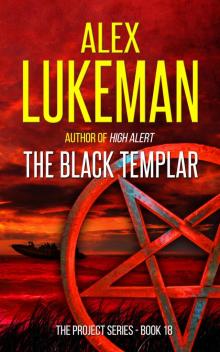 The Black Templar
The Black Templar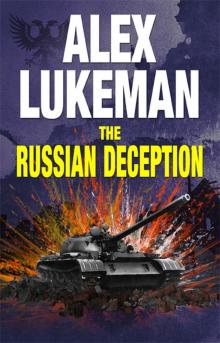 The Russian Deception
The Russian Deception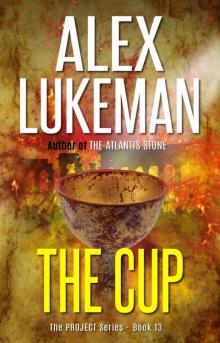 The Cup
The Cup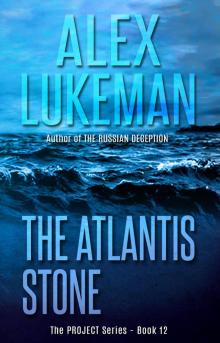 The Atlantis Stone
The Atlantis Stone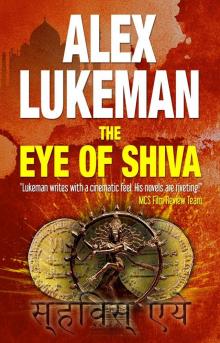 The Eye of Shiva
The Eye of Shiva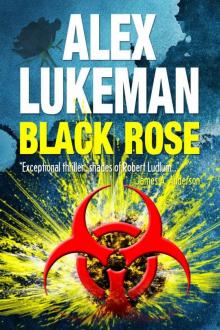 Black Rose (The Project Book 9)
Black Rose (The Project Book 9)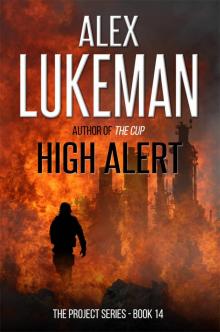 High Alert (The Project Book 14)
High Alert (The Project Book 14) Phoenix
Phoenix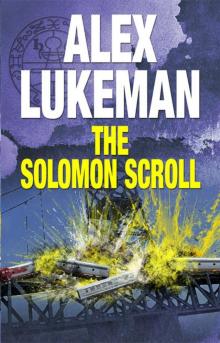 The Solomon Scroll
The Solomon Scroll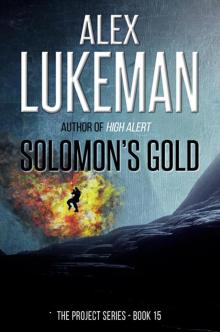 Solomon's Gold
Solomon's Gold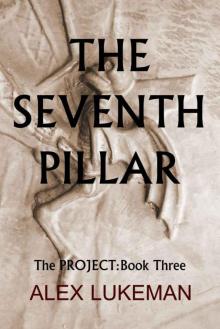 The Seventh Pillar
The Seventh Pillar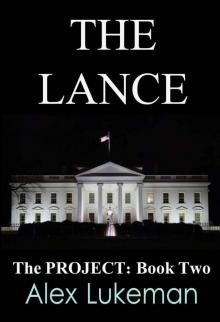 The Lance
The Lance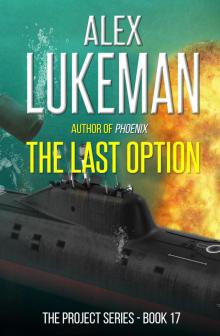 The Last Option
The Last Option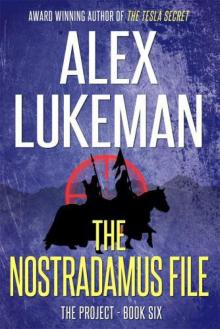 The Nostradamus File
The Nostradamus File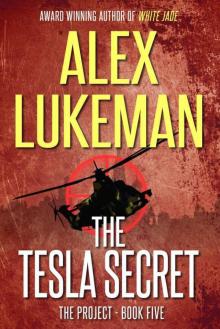 The Tesla Secret
The Tesla Secret